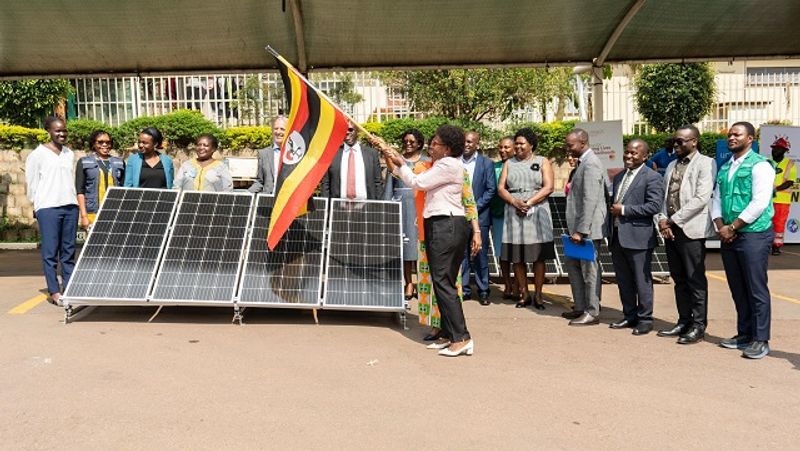
In a significant step toward improving vaccine preservation and immunisation coverage, the Ministry of Health has begun installing solar-powered cold chain refrigerators in health facilities across the country. The move, officials say, is aimed at curbing the high levels of vaccine wastage, which continue to hamper Uganda’s immunisation efforts.
The initiative, flagged off by Health Minister Dr. Jane Ruth Aceng, involves the deployment of 500 solar-powered fridges, prioritising health centres in off-grid areas or those facing challenges with hydroelectric power supply. The equipment was donated by the Africa Centres for Disease Control (Africa CDC) and the MasterCard Foundation, under a broader effort to strengthen immunisation infrastructure and safeguard public health.
“In many remote areas, power outages or lack of electricity have led to frequent spoilage of vaccines. This new equipment will be a game-changer,” Dr. Aceng said. She confirmed that installation will be completed in two months, adding that the donation also includes 1,746 remote temperature monitoring devices to ensure real-time oversight of storage conditions from a central monitoring hub.
The latest donation follows a similar 2024 intervention by Africa CDC, which delivered 38 cold chain units to Uganda’s newly designated cities. According to Yovan Wolman, Chief Child Survival and Development Officer at UNICEF, the $4.3 million donation is part of a broader mission to save lives and protect livelihoods.
“Uganda has made commendable progress in expanding vaccine access, but there remain areas where children are missing essential doses—largely due to poor cold storage and logistics,” Wolman said.
Uganda currently offers 14 vaccines under its routine immunisation schedule, including the recently introduced malaria vaccine, placing further strain on the cold chain system. However, maintaining high immunisation coverage remains a challenge. With over one million babies born annually, the volume of vaccines needed and stored continues to rise.
Although the Ministry of Health did not provide an official figure for annual vaccine losses, a recent study by Makerere University School of Public Health paints a concerning picture. Conducted in Mukono and Kalungu districts, the research assessed the wastage rates of six essential vaccines and revealed that figures exceeded both national and World Health Organization (WHO) benchmarks.
The study, published in the Global Public Health journal, found wastage rates of 70% for BCG, 58% for Measles-Rubella (MR), 31% for Injectable Polio Vaccine (IPV), and 28% for Oral Polio Vaccine (OPV). Pneumococcal vaccine (PCV) wastage stood at 17%, all far above the WHO-recommended thresholds.
WHO guidelines allow for a maximum of 50% wastage for BCG, 25% for measles, 10% for OPV, and 5–15% for other multi-dose and single-dose vaccines, depending on the packaging. The research identified poor storage conditions as one of the primary contributors to the losses.
Dr. Aceng said the new solar-powered fridges, equipped with continuous temperature monitoring, are expected to dramatically reduce spoilage rates and enhance vaccine reliability—especially in rural and hard-to-reach areas.
“This intervention will not only protect the integrity of our vaccines but also restore trust in the immunisation system,” she noted. “No child should miss a vaccine because the fridge failed.”
The rollout marks a major leap forward in Uganda’s fight against preventable diseases and highlights the importance of sustainable, energy-efficient solutions in strengthening public health infrastructure.














Aldrige Kennedy
Leave a Comment
Your email address will not be published.